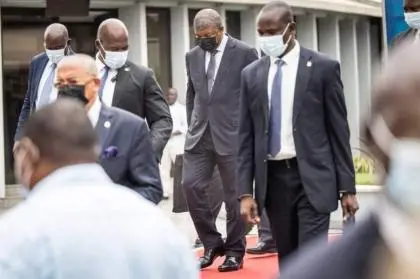ANGOLIA, Aug 26(ABC): Angola’s ruling party said Friday they held a “comfortable majority” in the country’s most competitive elections since independence, amid fears of political turmoil if the opposition contested the final results.
Final results were still expected, but provisional counts showed the People’s Movement for the Liberation of Angola (MPLA) was set to extend its stranglehold on power in the oil-rich southern African country, giving its leader President Joao Lourenco a second term in office.
“According to preliminary results, we have a comfortable majority,” MPLA spokesman Rui Falcao told journalists at the party’s headquarters in Luanda.
With 97 percent of ballots tallied, Angola’s electoral commission late Thursday said the MPLA had scored 51.07 percent of the vote.
The main opposition party — the National Union for the Total Independence of Angola (UNITA) led by Adalberto Costa Junior — had secured 44.05 percent, a huge jump from 26.67 percent in the 2017 election.
Alex Vines, of the UK-based think tank Chatham House, said it was likely Costa Junior’s party would object to the final count.
“We can expect… some months of political turbulence as UNITA will challenge the results,” he said.
Anastacio Ruben Sicato, a senior member of the opposition party, said the official results did not tally with their own count.
“We hope there can be common sense,” he said.
But, he added, “we are not encouraging a rebellion, the process is not over, we must remain calm”.
The MPLA has traditionally wielded control over the electoral process and state media, and opposition and civic groups have raised fears of voter tampering.
The party has ruled Angola for 47 years since the country gained independence from Portugal in 1975.
But it has seen a steady decline in support in recent elections.
While it romped to victory with 71.84 percent of votes in 2012, it only garnered 61 percent five years after that.
– ‘New era’ –
Augusto Santana, of the non-profit Democracy Works Foundation, predicted protests over the weekend.
“UNITA is not happy because they think they have won the elections,” he said.
The latest election has been overshadowed by a struggling economy, inflation, poverty and drought.
The opposition has proved popular in urban areas, winning in the capital Luanda and among youth disaffected with the ruling party.
Gilson Leopoldo, a 26-year-old accountant in Luanda, said young Angolans now had more access to information.
“The people have voted en masse for UNITA, and to end the vicious circle of corruption that plagues the country,” he said.
Angola is Africa’s second largest crude producer, but the oil bonanza has also nurtured corruption and nepotism.
Santana said that, even though the opposition was unlikely to manage to overturn the results, Wednesday’s vote could still usher in a “new era of politics”.
The MPLA looked set to retain a majority in parliament, he said, but would face more pushback from a larger number of UNITA lawmakers.
This “will motivate more dialogue”, he said.
Marisa Lourenco, an independent analyst based in Johannesburg, said times were changing as voters “no longer believe in the ruling party’s ability or will to change their socioeconomic prospects”.
“This is the last election the MPLA will win outright,” she said.

